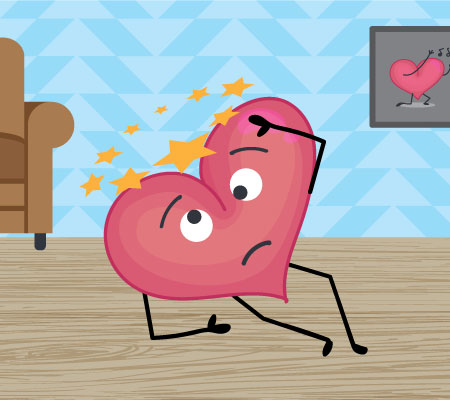According to the American Heart Association, about 41 percent of Americans have fainted at some time in their lives. While common, cardiac issues can be one of the causes of fainting.

It’s possible fainting could indicate a serious heart issue.
“The problem with fainting is it can be a sign of severe cardiac problems, which, if not addressed, may be the only symptom one has before they die suddenly,” said Dr. Weijia Wang, a Marshfield Clinic Health System cardiologist.
Dr. Wang stressed the vast majority of fainting episodes are not due to heart disease. However, you still need a medical evaluation to confirm that serious problems are not present.
Causes of fainting
Fainting can be a sign of a severe cardiac arrhythmia, which is irregular beating of the heart. If you do faint, Dr. Wang suggests a medical professional evaluates you as soon as possible.
RELATED ARTICLE: Lost your beat? Get it back
“If the fainting is heart-related, then it probably is very serious,” Dr. Wang said.
Another serious heart issue, aortic dissection, could be signified by fainting. This is a condition where the main artery of the heart splits apart. If not corrected quickly, it can be fatal. However, this condition is usually detected prior to a fainting episode because people prone to it will often have had previous heart issues.
A blood clot in the lungs also may cause fainting.
Dr. Wang said fainting during exercise is more worrisome than fainting when at rest. Fainting during exercise is more likely to be heart-related than other fainting episodes.
Determining if fainting is due to cardiac issues
Dr. Wang said the first thing he does with a patient who has fainted is thoroughly review their medical history and give them a physical examination.
This history includes asking the patient for a detailed description of their day leading up to and after the fainting episode. It is also good to ask witnesses for their recollection of events because a person who has fainted may have difficulty remembering everything that happened.
“All these details help us decide what the cause might be,” Dr. Wang said.
The history and physical could be followed by an electrocardiogram (EKG) test. An EKG helps determine if a person has disorders associated with arrhythmias, like Long QT syndrome or Brugada syndrome, which are both serious.
RELATED ARTICLE: The ins and outs of an EKG
The health care provider may also recommend a tilt table exam. A provider can use a tilt table exam to trigger the signs and symptoms of fainting. Doing this while also monitoring heart rate and blood pressure can help the health care provider determine the cause of the fainting.
Heart-related or not, fainting is worrisome
Fainting is dangerous even if it is unrelated to cardiac issues. For instance, if a person faints while driving, that can be very unsafe. You should address any fainting with a health care provider immediately.
“We want to rule out dangerous causes of fainting and see if there is anything that can be done to prevent a recurrence of fainting,” Dr. Wang said.
If you have had a recent fainting episode, contact your primary care provider today.
For fainting concerns, talk to a Marshfield Clinic Health System provider.
Schedule appointment Message your provider
Related Shine365 articles
Why some people have low sodium levels in their blood
Pacemaker surgery: Fixing low heart rate or bradycardia
Sock marks may signal high blood pressure

